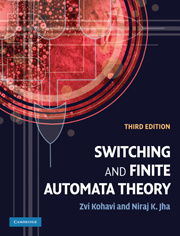Description
Switching and Finite Automata Theory (3rd Ed., Revised edition)
Authors: Kohavi Zvi, Jha Niraj K.
Understand the structure, behaviour, and limitations of logic machines with this thoroughly updated third edition.
Language: English
Subject for Switching and Finite Automata Theory:
Approximative price 142.05 €
Subject to availability at the publisher.
Add to cart
Publication date: 10-2009
630 p. · 19.3x25.2 cm · Hardback
630 p. · 19.3x25.2 cm · Hardback
Description
/li>Contents
/li>Biography
/li>
Understand the structure, behaviour, and limitations of logic machines with this thoroughly updated third edition. Many new topics are included, such as CMOS gates, logic synthesis, logic design for emerging nanotechnologies, digital system testing, and asynchronous circuit design, to bring students up-to-speed with modern developments. The intuitive examples and minimal formalism of the previous edition are retained, giving students a text that is logical and easy to follow, yet rigorous. Kohavi and Jha begin with the basics, and then cover combinational logic design and testing, before moving on to more advanced topics in finite-state machine design and testing. Theory is made easier to understand with 200 illustrative examples, and students can test their understanding with over 350 end-of-chapter review questions.
Preface; Part I. Preliminaries: 1. Number systems and codes; 2. Sets, relations, and lattices; Part II. Combinational Logic: 3. Switching algebra and its applications; 4. Minimisation of switching functions; 5. Logic design; 6. Multilevel logic synthesis; 7. Threshold logic for nanotechnologies; 8. Testing of combinational circuits; Part III. Finite State Machines: 9. Introduction to synchronous sequential circuits and iterative networks; 10. Capabilities, minimisation, and transformation of sequential machines; 11. Asynchronous sequential circuits; 12. Structure of sequential machines; 13. State-identification experiments and testing of sequential circuits; 14. Memory, definiteness, and information losslessness of finite automata; 15. Linear sequential machines; 16. Finite-state recognisers; Index.
Zvi Kohavi is Executive Vice President and Director General at Technion – Israel Institute of Technology. He is Professor Emeritus of the Computer Science Department at Technion, where he held the position of Sir Michael and Lady Sobell Chair in Computer Engineering and Electronics. He has previously served as the Managing Director of the Technion Research and Deveopment Foundation, and on the faculty of M.I.T. and the University of Utah.
Niraj K. Jha is a Professor at Princeton University and a Fellow of the IEEE and ACM. He is currently serving as Editor-in-Chief of IEEE Transactions on VLSI Systems and Associate Editor of IEEE Transactions on Computer-Aided Design, IEEE Transactions on Circuits and Systems, and Journal of Low Power Electronics. He is a recipient of the AT&T Foundation Award and NEC Preceptorship Award for research excellence, the NCR Award for teaching excellence, and Princeton's Graduate Mentoring Award.
Niraj K. Jha is a Professor at Princeton University and a Fellow of the IEEE and ACM. He is currently serving as Editor-in-Chief of IEEE Transactions on VLSI Systems and Associate Editor of IEEE Transactions on Computer-Aided Design, IEEE Transactions on Circuits and Systems, and Journal of Low Power Electronics. He is a recipient of the AT&T Foundation Award and NEC Preceptorship Award for research excellence, the NCR Award for teaching excellence, and Princeton's Graduate Mentoring Award.
© 2024 LAVOISIER S.A.S.




